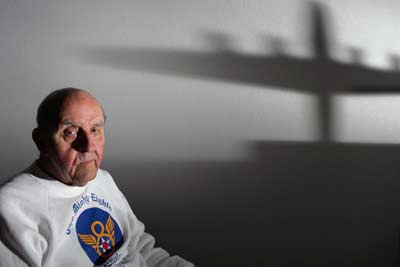My grandfather is in his final days. He’s 92. He has a frontal lobe brain tumor. He can do little more than lie in bed and drift in and out of consciousness, in and out of dementia.
In his most lucid moments, he still doesn’t want to believe he’s dying. Part of me has been deeply frustrated with him – how can he keep forcing my parents through the pain of telling him, again and again, that he won’t be leaving this place? At his age and state of health, as a lifelong Catholic, can’t he make peace with the fact?
Then I remembered my namesake’s most famous poem, about his father’s decline (I’m certain I’ve posted it before), and my anger dropped away.
It’s his life. He’s right to want to keep it, as fiercely and for as long as possible. Nobody can tell him otherwise. Least of all those of us who care for him. He flew alongside men who died in combat at 22. Every moment he gets is earned.
Do not go gentle into that good night,
Old age should burn and rave at close of day;
Rage, rage against the dying of the light.
Though wise men at their end know dark is right,
Because their words had forked no lightning they
Do not go gentle into that good night.
Good men, the last wave by, crying how bright
Their frail deeds might have danced in a green bay,
Rage, rage against the dying of the light.
Wild men who caught and sang the sun in flight,
And learn, too late, they grieved it on its way,
Do not go gentle into that good night.
Grave men, near death, who see with blinding sight
Blind eyes could blaze like meteors and be gay,
Rage, rage against the dying of the light.
And you, my father, there on the sad height,
Curse, bless, me now with your fierce tears, I pray.
Do not go gentle into that good night.
Rage, rage against the dying of the light.
– Dylan Thomas
photo by John Locher

Allie
August 21 2010 / 1:14 am
When I went through my grandmother’s things after her death, one of the things I found was a child’s plastic pocketbook. In it was a very nice diamond engagement ring (provenance undetermined, not listed on the insurance rider with her other jewelry), the baby Jesus from a small ceramic nativity set, and a copy of this poem cut out from the newspaper more than fifteen years before her death. Nothing else, just those three things.
Somewhere I read an interpretation of the poem which points out the word “good.” Do not go gently into that GOOD night. So it’s an affirmation and a defiance at the same time.
I’m sorry to hear about your grandfather. Peace to you and your family.